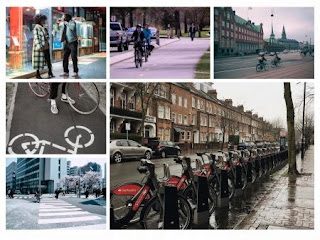NEED TO DEMOCRATIZE THE STREETS TO MAKE THEM LIVELY AND INCLUSIVE
AUTHOR: AR. RITA MINHAS
India is the second most populated country after China and by 2050; its population is expected to cross China’s Population. The process of Urbanization over the past 110 years depicts that there is 15 times increase in the number of people residing in urban areas.


.
This is a big number as the number of urban agglomerations have increased four times. India had road density of 142.7 km/100 sq.km in 2011 and approximately 4.87 kilometres of roads per 1000 people.
Interestingly, India has 22 cars per 1,000 individuals. This means remaining 978 people are likely to use public transport, or two wheeler, or are going to walk. Many countries across the world aim at creating 15 minute or 20 minute neighbourhoods, a step towards sustainable and inclusive cities, the need felt more during the Covid 19 pandemic. Indian cities need to provide more infrastructures for pedestrians, and create cycle lanes. Streets are not just the places where we go from one place to another. These are a places for social interaction, outdoor recreation, and business.
In Montreal, Canada initiatives like signs that tell cyclists where the bike lane continues are very helpful for the cyclists. In addition the traffic lights are timed for pedestrians and bicyclists.
Strasbourg, France’s premier bicycle city has maintained its top-ranking status where 16% of locals ride a bike to work and more and more people are seen using cargo bikes for everyday tasks. Cities like Barcelona and Strasbourg have reclaimed space from cars redefining streets, inviting residents and visitors to socialize and get creative.

Situations like Covid 19 have taught urban planners that having mixed use development and providing wider footpaths and bicycle lanes is going to pay-off aiding in building healthier, safer, inclusive and more interactive societies. Cities can be more liveable and they must aim to reduce their carbon footprint by improving the accessibility and efficiency of transport.

European cities are paying a lot of attention towards making walk able and inclusive neighbourhoods. A company named Copenhagenize Design Co. has launched the Copenhagenize Index ranking of bicycle-friendly cities on planet earth. Copenhagen, Amsterdam, Utrecht, Antwerp, Strasbourg, Bordeaux , Berlin, Vienna, Barcelona are some of the world’s top ranking bicycle friendly cities. A screenshot of Barcelona city from google maps shows allocation of road space for different users on a street in Copenhagen, one of the world’s pioneering Cycle friendly cities.
The map shows bicycle lanes in the city of Barcelona. The City Council aimed that by 2018, 95% of the city’s population would have a cycle lane within 300 metres of their home. This required massive intervention for various streets which included creation of new bicycle lanes, signposting bicycle streets , their integration into the network, their control and design, make cycling safer, reduce conflicts with pedestrians.

Many cities are providing free of charge parking at metro stations. Bicycle transport in cities like Vienna is free of cost during week days for a particular number of hours. In order to facilitate the tourists, many cities have launched apps that guide tourists in smoothly cruising through the city cycle lanes.
Planners across the planet are realizing the mistake for making cities which were mostly car friendly. Citizens in many developed countries have started reclaiming the important street space from cars. In Indian context, the transferability of walkable cities or 15 minute city will face many challenges but every re-development or new development project should consider pedestrian and cycling infrastructures as important part of their plans.
ABOUT THE AUTHOR

AR. RITA MINHAS
Graduation in Architecture, AIIA
Master of City Planning IIT KHARAGPUR
Registered Valuer (Land & Building)
IBBI Registration Number: IBBI/RV/10/2021/13874
CORE COMPETENCE & INDUSTRY-SPECIFIC EXPERIENCE
Residential and commercial Architecture, Earthquake Safe Technology Implementation in construction, Master Planning, MIS, GIS Mapping, Neighbourhood Planning, Affordable housing, Estimation & Budgeting. She has 15 years of experience in Residential Architecture and the real estate industry which has provided her good understanding of a variety of projects. She has been handling Valuation Assignments for Land & Building for various Banks as well as companies under Company Act.
